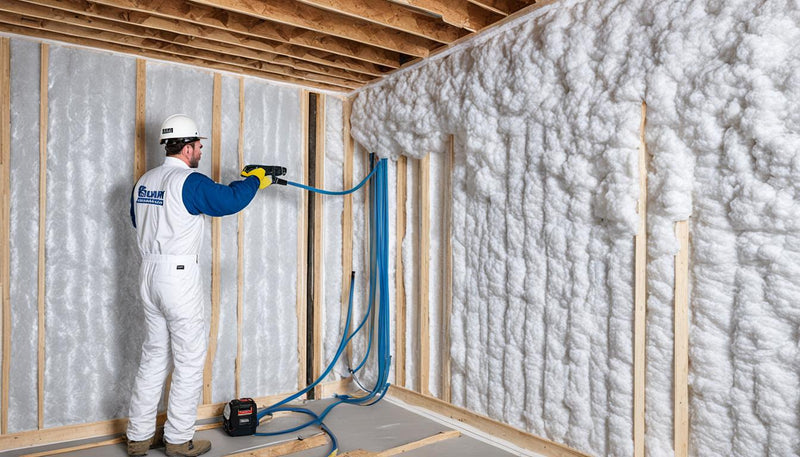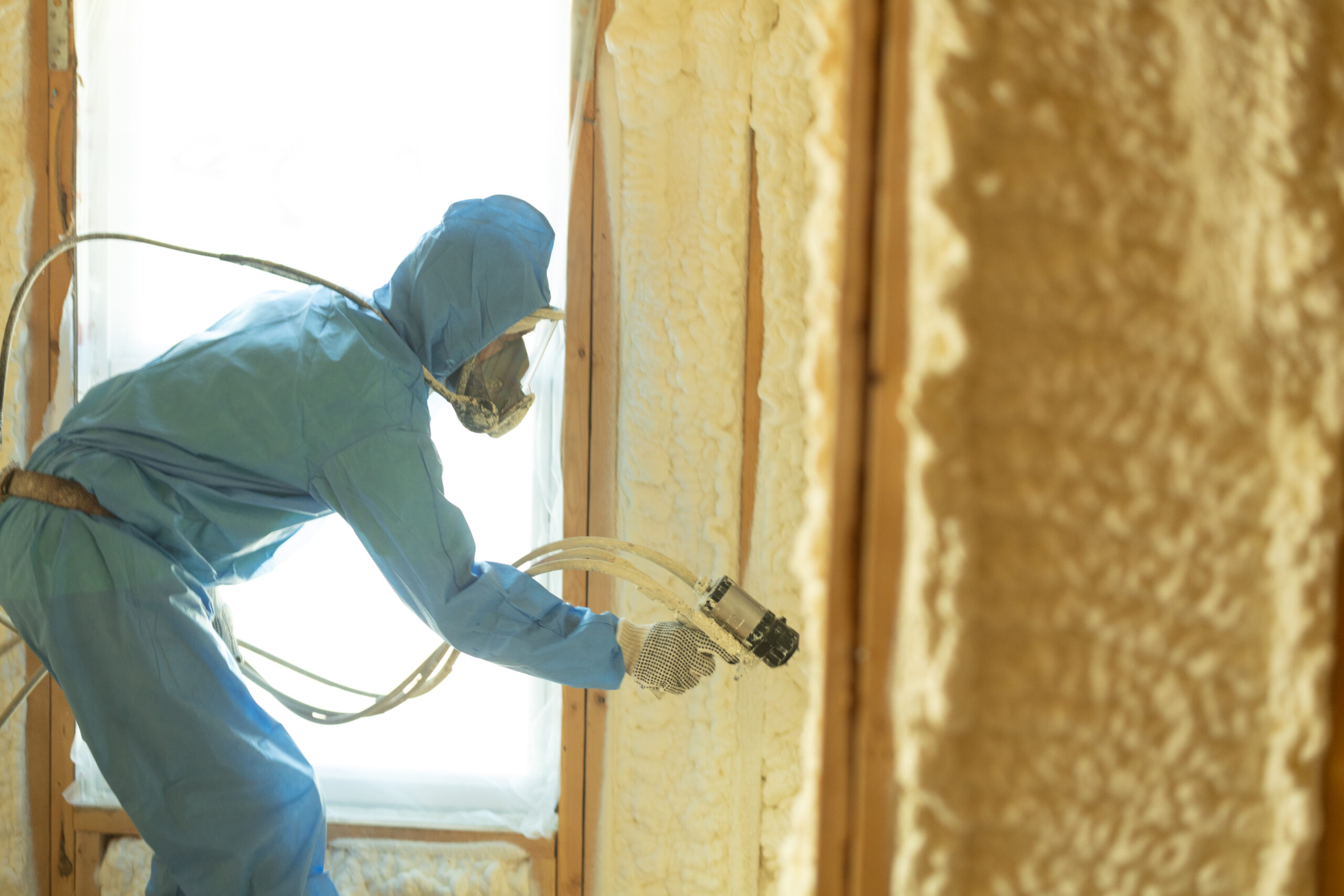Tips for Maintaining Your Spray Foam Insulation for Long-Term Performance
Tips for Maintaining Your Spray Foam Insulation for Long-Term Performance
Blog Article
Spray Foam: The Ultimate Remedy for Air Sealing and Insulation
Spray foam insulation has actually emerged as a leading remedy for effective air securing and thermal insulation, providing a distinct mix of residential or commercial properties that set it apart from traditional methods. Its capacity to expand and load gaps makes it specifically reliable in preventing air leakage, which can dramatically affect power performance. Understanding the full extent of its advantages, installment processes, and comparisons with other insulation types is essential for making notified decisions. As we check out these facets, the implications for both new building and constructions and retrofits end up being increasingly considerable. What aspects should affect your option?
What Is Spray Foam?
Spray foam is a flexible insulation product that integrates the concepts of air sealing and thermal resistance to boost energy efficiency in structures. Composed primarily of polyurethane or various other similar substances, spray foam is applied as a liquid that increases upon contact with surface areas, developing a solid, continual layer of insulation. This distinct building enables it to fill spaces, cracks, and spaces that traditional insulation products may overlook, supplying a superior air seal.
There are 2 main kinds of spray foam: open-cell and closed-cell. Open-cell spray foam is lighter and much more versatile, offering excellent audio absorption and a reduced R-value per inch - Spray Foam. On the other hand, closed-cell spray foam is denser, supplying a higher R-value, moisture resistance, and included structural stability to constructing components
The application procedure generally involves customized tools, making sure a seamless application that abides by different substratums, including wood, concrete, and steel. This versatility makes spray foam ideal for both brand-new building and constructions and retrofitting existing frameworks. Its capability to produce a closed obstacle considerably adds to lowering energy intake and boosting interior air high quality, therefore making it a preferred selection amongst home owners and builders alike.
Advantages of Spray Foam Insulation
One of one of the most significant advantages of spray foam insulation is its outstanding capability to create a continuous air barrier, which effectively reduces power loss. Unlike typical insulation products, spray foam expands to fill up spaces and cracks, guaranteeing that air leak is significantly reduced. This particular not only enhances power effectiveness yet additionally leads to decrease utility costs gradually.
Additionally, spray foam insulation supplies premium thermal resistance, adding to an extra secure indoor environment. Its high R-value per inch permits efficient insulation in constrained rooms, making it ideal for attics, wall surfaces, and crawl rooms. The moisture-resistant homes of spray foam help prevent mold and mildew growth, promoting healthier living conditions.
Another important benefit of spray foam insulation is its sound-dampening high qualities (Spray Foam). It efficiently minimizes sound transmission between spaces, developing a quieter and much more comfy home environment. The longevity of spray foam also sticks out, as it does not sag or settle with time, maintaining its efficiency throughout its lifespan
How Spray Foam Functions
Comprehending how spray foam insulation works is crucial for valuing its performance in air sealing and thermal resistance. Spray foam insulation contains 2 primary parts: isocyanate and polyol material. When these parts are combined, they undertake a chemical response that triggers the product to broaden rapidly, creating a dense foam that loads cavities, gaps, and splits.
As the foam expands, it complies with surface areas, creating an impermeable seal that significantly reduces air seepage. This particular makes spray foam insulation highly reliable at avoiding drafts and moisture infiltration, which can bring about energy loss and damage over time. In addition, the closed-cell variation of spray foam uses premium thermal resistance due to its rigid structure, successfully decreasing warmth transfer.
The one-of-a-kind properties of spray foam allow it to adjust to uneven surfaces, making sure extensive protection and a seamless obstacle. As an outcome, spray foam insulation not only improves power effectiveness but likewise contributes to enhanced interior air quality by lowering the build-up of allergens and contaminants. Ultimately, comprehending the technicians behind spray foam emphasizes its role as a pop over to these guys remarkable selection for insulation and air sealing in both property and commercial applications.
Setup Process Summary

Prior to installment, the space should be adequately cleaned up and prepped, making certain that surfaces are totally free from moisture, dust, and particles. Due to the fact that contaminants can jeopardize bond and total efficiency, this action is crucial. Once the location is prepared, the application involves blending both elements of the spray foam, which broadens upon contact and fills up gaps properly.
Educated specialists need to perform the installment, making use of specific tools to guarantee uniform protection and optimum thickness. Safety precautions, consisting of putting on protective gear and making certain appropriate air flow, are imperative during this procedure. After application, the foam usually remedies swiftly, creating a solid barrier that enhances energy effectiveness.
Contrasting Spray Foam to Conventional Insulation
When assessing insulation alternatives, spray foam insulation stands apart in contrast to typical materials such as fiberglass and cellulose. Among the primary advantages of spray foam is its remarkable air securing abilities. Unlike fiberglass and cellulose, which can permit air seepage, spray foam increases upon application, filling spaces and crevices to produce an airtight seal. This leads to improved power performance, as less heated or cooled air leaves the home, bring about lower utility costs.
Additionally, spray foam offers a greater R-value per inch than typical insulation types, providing even more reliable thermal resistance in a thinner account. This characteristic is particularly beneficial in areas with minimal cavity depth. Spray foam is immune to moisture and mold development, which can be a significant concern with cellulose and fiberglass, specifically in moist environments.
Nonetheless, spray foam insulation usually carries a greater upfront cost than its standard counterparts. Homeowners need to evaluate this first investment versus lasting energy financial savings and performance benefits. Inevitably, while both insulation kinds serve their objective, spray foam arises as an advanced service for modern-day insulation needs, especially in regards to discover here air securing and thermal performance.

Verdict
In summary, spray foam insulation represents a highly reliable remedy for achieving Continue optimal air sealing and thermal resistance. Its unique buildings, consisting of dampness resistance and noise dampening, make it suitable for numerous applications in both new constructions and retrofitting tasks (Spray Foam). The first prices may be greater compared to typical insulation products, the long-lasting advantages, such as significant energy financial savings and improved interior air high quality, warrant the investment and emphasize its worth in modern-day building methods.
Spray foam insulation has emerged as a leading remedy for reliable air securing and thermal insulation, using an one-of-a-kind mix of properties that establish it apart from standard techniques.Spray foam is a versatile insulation product that incorporates the concepts of air sealing and thermal resistance to boost power effectiveness in buildings.When reviewing insulation alternatives, spray foam insulation stands out in comparison to traditional products such as fiberglass and cellulose. Eventually, while both insulation kinds offer their purpose, spray foam arises as a much more advanced remedy for contemporary insulation needs, particularly in terms of air securing and thermal effectiveness.
In summary, spray foam insulation represents a very efficient service for achieving optimum air securing and thermal resistance.
Report this page